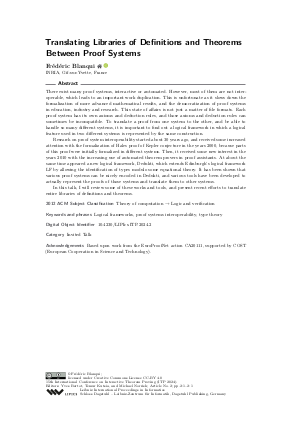@InProceedings{blanqui:LIPIcs.ITP.2024.2,
author = {Blanqui, Fr\'{e}d\'{e}ric},
title = {{Translating Libraries of Definitions and Theorems Between Proof Systems}},
booktitle = {15th International Conference on Interactive Theorem Proving (ITP 2024)},
pages = {2:1--2:1},
series = {Leibniz International Proceedings in Informatics (LIPIcs)},
ISBN = {978-3-95977-337-9},
ISSN = {1868-8969},
year = {2024},
volume = {309},
editor = {Bertot, Yves and Kutsia, Temur and Norrish, Michael},
publisher = {Schloss Dagstuhl -- Leibniz-Zentrum f{\"u}r Informatik},
address = {Dagstuhl, Germany},
URL = {https://drops.dagstuhl.de/entities/document/10.4230/LIPIcs.ITP.2024.2},
URN = {urn:nbn:de:0030-drops-207307},
doi = {10.4230/LIPIcs.ITP.2024.2},
annote = {Keywords: Logical frameworks, proof systems interoperability, type theory}
}

 Creative Commons Attribution 4.0 International license
Creative Commons Attribution 4.0 International license
